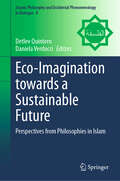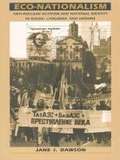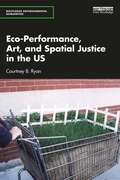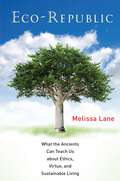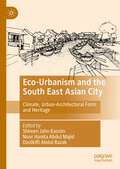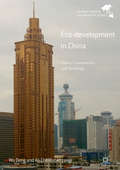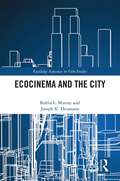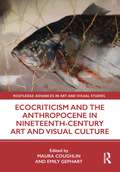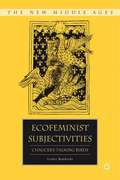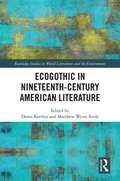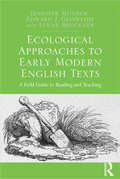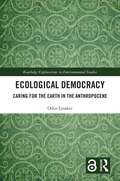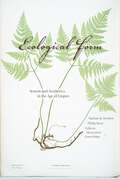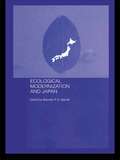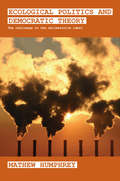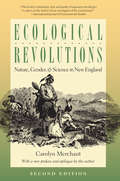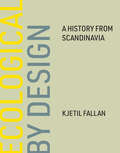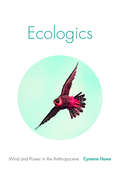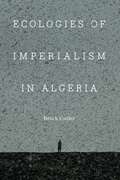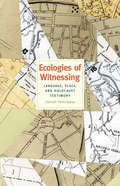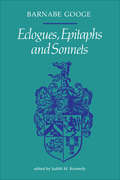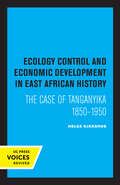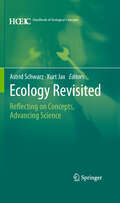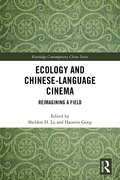- Table View
- List View
Eco-Imagination towards a Sustainable Future: Perspectives from Philosophies in Islam (Islamic Philosophy and Occidental Phenomenology in Dialogue #8)
by Detlev Quintern Daniela VerducciThe Volume brings together scholars from Azerbaijan, Egypt, Germany, India, Iran, Iraq, Italy, the Netherlands, and Turkey to approach the new field of Eco-Imagination from various philosophical and disciplinary backgrounds. Sufism and its Micro-Macro philosophy in Ikhwan al-Safa, Ibn Arabi, Suhrawardy, Nishabouri, and Mulla Sadra are in dialogue with the Logos of Life Philosophy founded by Anna-Teresa Tymieniecka (1923 – 2014). This book provides a multi-perspective insight into the understanding of Life in Islamic Philosophies. Philosophers, mystics, and poets from a variety of Islamic countries, schools, and worldviews are introduced and debated. Sustainable futures evolved in harmony with everything there is alive (Anna-Teresa Tymieniecka), are currently more threatened than ever. Wars, ecological destructivity, the climate crisis, and not least the crisis of the Human Being call urgently for a cross-religious, cultural, and generational understanding. Lively debates in Islam, taking place on philosophical problems for hundreds of years, often based on the same roots as in Occidental Phenomenology, e.g., Plato, Aristotle, and Plotinus, are still too little known in the Occident/West. The prolific and poetic arguments, introduced for the first time in an eco-imaginative horizon, do not belong to the past. This volume invites students and researchers to uncover Islamic Philosophies’ potentialities for a shared sustainable future.
Eco-Nationalism: Anti-Nuclear Activism and National Identity in Russia, Lithuania, and Ukraine
by Jane I. DawsonEco-nationalism examines the spectacular rise of the anti-nuclear power movement in the former Soviet Union during the early perestroika period, its unexpected successes in the late 1980s, and its substantial decline after 1991. Jane I. Dawson argues that anti-nuclear activism, one of the most dynamic social forces to emerge during these years, was primarily a surrogate for an ever-present nationalism and a means of demanding greater local self-determination under the Soviet system. Rather than representing strongly held environmental and anti-nuclear convictions, this activism was a political effort that reflected widely held anti-Soviet sentiments and a resentment against Moscow's domination of the region--an effort that largely disappeared with the dissolution of the USSR.Dawson combines a theoretical framework based on models of social movements with extensive field research to compare the ways in which nationalism, regionalism, and other political demands were incorporated into anti-nuclear movements in Russia, Lithuania, Ukraine, Armenia, Tatarstan, and Crimea. These comparative case studies form the core of the book and trace differences among the various regional movements to the distinctive national identities of groups involved. Reflecting the new opportunities for research that have become available since the late 1980s, these studies draw upon Dawson's extended on-site observation of local movements through 1995 and her unique access to movement activists and their personal archives.Analyzing and documenting a development with sobering and potentially devastating implications for nuclear power safety in the former USSR and beyond, Eco-nationalism's examination of social activism in late and postcommunist societies will interest readers concerned with the politics of global environmentalism and the process of democratization in the post-Soviet world.
Eco-Performance, Art, and Spatial Justice in the US (Routledge Environmental Humanities)
by Courtney B. RyanIn Eco-Performance, Art, and Spatial Justice in the US, Courtney B. Ryan traces how urban artists in the US from the 1970s until today contend with environmental domestication and spatial injustice through performance. In theater, art, film, and digital media, the artists featured in this book perform everyday, spatialized micro-acts to contest the mutual containment of urbanites and nonhuman nature. Whether it is plant artist Vaughn Bell going for a city stroll in her personal biosphere, photographer Naima Green photographing Black urbanites in lush New York City parks, guerrilla gardeners launching seed bombs into abandoned city lots, or a satirical tweeter parodying BP’s response to the 2010 Deepwater Horizon oil spill, the subjects in this book challenge deeply engrained Western directives to domesticate nonhuman nature. In examining how urban eco-artists perform alternate ecologies that celebrate the interconnectedness of marginalized human, vegetal, and aquatic life, Ryan suggests that small environmental performances can expose spatial injustice and increase spatial mobility. Bringing a performance perspective to the environmental humanities, this interdisciplinary text offers readers stymied by the global climate crisis a way forward. It will appeal to a wide range of students and academics in performance, media studies, urban geography, and environmental studies.
Eco-Republic: What the Ancients Can Teach Us about Ethics, Virtue, and Sustainable Living (Peter Lang Ltd Ser. #23)
by Melissa LaneAncient lessons for sustainable citizenshipAn ecologically sustainable society cannot be achieved without citizens who possess the virtues and values that will foster it, and who believe that individual actions can indeed make a difference. Eco-Republic draws on ancient Greek thought—and Plato's Republic in particular—to put forward a new vision of citizenship that can make such a society a reality. Melissa Lane develops a model of a society whose health and sustainability depend on all its citizens recognizing a shared standard of value and shaping their personal goals and habits accordingly. Bringing together the moral and political ideas of the ancients with the latest social and psychological theory, Lane illuminates the individual's vital role in social change, and articulates new ways of understanding what is harmful and what is valuable, what is a benefit and what is a cost, and what the relationship between public and private well-being ought to be.Eco-Republic reveals why we must rethink our political imagination if we are to meet the challenges of climate change and other urgent environmental concerns. Offering a unique reflection on the ethics and politics of sustainability, the book goes beyond standard approaches to virtue ethics in philosophy and current debates about happiness in economics and psychology. Eco-Republic explains why health is a better standard than happiness for capturing the important links between individual action and social good, and diagnoses the reasons why the ancient concept of virtue has been sorely neglected yet is more relevant today than ever.
Eco-Urbanism and the South East Asian City: Climate, Urban-Architectural Form and Heritage
by Shireen Jahn Kassim Noor Hanita Abdul Majid Dzulkifli Abdul RazakThis book traces the history of urban design in tropical South East Asia with a view to offering solutions to contemporary architectural and urban problems. The book examines how pre-colonial forms and patterns from South East Asian traditional cities, overlaid by centuries of change, recall present notions of ecological and organic urbanism. These may look disorganised, yet they reflect and suggest certain common patterns that inform eco-urban design paradigms for the development of future cities.Taking a thematic approach, the book examines how such historical findings, debates and discussions can assist designers and policy makers to interpret and then instil identities in urban design across the Asian region. The book weaves a discourse across planning, urban design, architecture and ornamentation dimensions to reconstruct forgotten forms that align with the climate of place and resynchronise with the natural world, unearthing an ecologically benign urbanism that can inform the future.Written in an accessible style, this book will be an invaluable reference for researchers and students within the fields of cultural geography, urban studies and architecture.
Eco-development in China: Cities, Communities And Buildings (Palgrave Series In Asia And Pacific Studies)
by Ali Cheshmehzangi Wu DengThis book explores China’s eco-development strategies and practices from a multi-scalar perspective, discussing the importance of interplay between multi spatial levels of the built environment, as well as the stakeholders who are key players for China’s eco-development. Based on a selection of eco-development Chinese case studies - eco-city, eco-community and eco-building - it highlights how specific eco initiatives and green features are applied and practiced, offering a guide to China’s strategy directions and design and planning trends. The book identifies gaps and strategies and solutions for future eco-development expected to take place in China in the coming decades, as well as useful references for eco-development in other countries, and provides a useful resource for studies in the fields of urbanism, sustainable development and eco-design.
Ecocinema in the City (Routledge Advances in Film Studies)
by Robin L. Murray Joseph K. HeumannIn Ecocinema in the City, Murray and Heumann argue that urban ecocinema both reveals and critiques visions of urban environmentalism. The book emphasizes the increasingly transformative power of nature in urban settings, explored in both documentaries and fictional films such as Children Underground, White Dog, Hatari! and Lives Worth Living. The first two sections—"Evolutionary Myths Under the City" and "Urban Eco-trauma"—take more traditional ecocinema approaches and emphasize the city as a dangerous constructed space. The last two sections—"Urban Nature and Interdependence" and "The Sustainable City"—however, bring to life the vibrant relationships between human and nonhuman nature. Ecocinema in the City provides a space to explore these relationships, revealing how ecocinema shows that both human and nonhuman nature can interact sustainably and thrive.
Ecocriticism and the Anthropocene in Nineteenth-Century Art and Visual Culture (Routledge Advances in Art and Visual Studies)
by Maura CoughlinIn this volume, emerging and established scholars bring ethical and political concerns for the environment, nonhuman animals and social justice to the study of nineteenth-century visual culture. They draw their theoretical inspiration from the vitality of emerging critical discourses, such as new materialism, ecofeminism, critical animal studies, food studies, object-oriented ontology and affect theory. This timely volume looks back at the early decades of the Anthropocene to query the agency of visual culture to critique, create and maintain more resilient and biologically diverse local and global ecologies.
Ecofeminist Subjectivities
by Lesley KordeckiThis bookanalyzes theinteraction between gender and species in Chaucer's poetry and strives to understand his adaptation of medieval discourse through an ecofeminist lens. Works that either speak of animals, or more pertinently those with animals speaking, offer fruitful results in the attempt to understand the medieval textual handling of the 'others' of society. "
Ecogothic in Nineteenth-Century American Literature (Routledge Studies in World Literatures and the Environment)
by Dawn Keetley Matthew Wynn SivilsFirst Published in 2017. Routledge is an imprint of Taylor & Francis, an Informa company.
Ecological Approaches to Early Modern English Texts: A Field Guide to Reading and Teaching
by Jennifer Munroe Edward J. GeisweidtEcocriticism has steadily gained footing within the larger arena of early modern scholarship, and with the publication of well over a dozen monographs, essay collections, and special journal issues, literary studies looks increasingly ’green’; yet the field lacks a straightforward, easy-to-use guide to do with reading and teaching early modern texts ecocritically. Accessible yet comprehensive, the cutting-edge collection Ecological Approaches to Early Modern English Texts fills this gap. Organized around the notion of contact zones (or points of intersection, that have often been constructed asymmetrically-especially with regard to the human-nonhuman dichotomy), the volume reassesses current trends in ecocriticism and the Renaissance; introduces analyses of neglected texts and authors; brings ecocriticism into conversation with cognate fields and approaches (e.g., queer theory, feminism, post-coloniality, food studies); and offers a significant section on pedagogy, ecocriticism and early modern literature. Engaging points of tension and central interest in the field, the collection is largely situated in the 'and/or' that resides between presentism-historicism, materiality-literary, somatic-semiotic, nature-culture, and, most importantly, human-nonhuman. Ecological Approaches to Early Modern English Texts balances coverage and methodology; its primary goal is to provide useful, yet nuanced discussions of ecological approaches to reading and teaching a range of representative early modern texts. As a whole, the volume includes a diverse selection of chapters that engage the complex issues that arise when reading and teaching early modern texts from a green perspective.
Ecological Democracy: Caring for the Earth in the Anthropocene (Routledge Explorations in Environmental Studies)
by Odin LysakerRe-Imagining Ecological Democracy offers an original, thought-provoking, and engaging treatment of why and how democracy should be re-imagined in reaction to today’s ecological crisis. The book explains that one need to re-imagine both the view on nature and democratic ideals within the same framework in the Anthropocene, the present geological epoch of human-made instability in the Earth system and its planetary boundaries. This book proposes unique and challenging readings of green political theory and its development of ecological democracy in the last four decades. The book is the first to offer a systematic and detailed interpretation of the role of critical theory vis–à–vis green political theory through an update regarding current non-anthropocentric critical theorists and how they may contribute to the further development of ecological democracy. Re-Imagining Ecological Democracy builds further on deep ecology, ecophenomenology, and animism by articulating an ecocentric view on nature which defends an intrinsic moral value of all existence as well as formulating the democratic principle of all ecologically affected parties. This book provides a sophisticated, convincing, and accessible argument for how to re-imagine ecological democracy as ecocentrism in practice: ecological love. To love ecologically means caring for and encountering all existence on the Earth and in the cosmos. This book is multi-disciplinary and will be of great value to researchers as well as undergraduate and postgraduate students from many disciplines.
Ecological Democracy: Caring for the Earth in the Anthropocene (Routledge Explorations in Environmental Studies)
by Odin LysakerEcological Democracy offers an original, thought-provoking, and engaging treatment of why and how democracy should be re-imagined in reaction to today’s ecological crisis. The book explains that one need to re-imagine both the view on nature and democratic ideals within the same framework in the Anthropocene, the present geological epoch of human-made instability in the Earth system and its planetary boundaries. This book proposes unique and challenging readings of green political theory and its development of ecological democracy in the last four decades. The book is the first to offer a systematic and detailed interpretation of the role of critical theory vis-à-vis green political theory through an update regarding current non-anthropocentric critical theorists and how they may contribute to the further development of ecological democracy. Ecological Democracy builds further on deep ecology, ecophenomenology, and animism by articulating an ecocentric view on nature which defends an intrinsic moral value of all existence as well as formulating the democratic principle of all ecologically affected parties.This book provides a sophisticated, convincing, and accessible argument for how to re-imagine ecological democracy as ecocentrism in practice: ecological love. To love ecologically means caring for and encountering all existence on the Earth and in the cosmos. This book is multi-disciplinary and will be of great value to researchers as well as undergraduate and postgraduate students from many disciplines.The Open Access version of this book, available at http://www.taylorfrancis.com, has been made available under a Creative Commons [Attribution-Non Commercial-No Derivatives (CC-BY-NC-ND)] 4.0 license.
Ecological Form: System and Aesthetics in the Age of Empire
by Nathan K. Hensley Philip SteerEcological Form brings together leading voices in nineteenth-century ecocriticism to suture the lingering divide between postcolonial and ecocritical approaches. Together, these essays show how Victorian thinkers used aesthetic form to engage problems of system, interconnection, and dispossession that remain our own. The authors reconsider Victorian literary structures in light of environmental catastrophe; coordinate “natural” questions with sociopolitical ones; and underscore the category of form as a means for generating environmental—and therefore political—knowledge. Moving from the elegy and the industrial novel to the utopian romance, the scientific treatise, and beyond, Ecological Form demonstrates how nineteenth-century thinkers conceptualized the circuits of extraction and violence linking Britain to its global network. Yet the book’s most pressing argument is that this past thought can be a resource for reimagining the present.
Ecological Modernisation and Japan
by Brendan F.D. BarrettIn the 1990s, Japan gradually began to turn green and started to experiment with more participatory forms of environmental governance. Ecological Modernisation and Japan explores this transformation and looks at Japan as a case for ecological modernisation while contextualising the discussion within its unique history and recent discussions about globalisation and sustainability. It makes a significant contribution to the ecological modernisation debate by unpacking the Japanese environmental experience.
Ecological Politics and Democratic Theory: The Challenge to the Deliberative Ideal (Extremism and Democracy)
by Mathew HumphreyThis volume examines the reasons why some despair at the prospects for an ecological form of democracy, and challenges the recent ‘deliberative turn’ in environmental political thought. Deliberative democracy has become popular for those seeking a reconciliation of these two forms of politics. Demand for equal access to a public forum in which the best argument will prevail appears to offer a way of incorporating environmental interests into the democratic process. This book argues that deliberative theory, far from being friendly to the environmental movement, shackles the ability those seeking radical change to make their voices heard in the most effective manner. Mathew Humphrey challenges beliefs about the relationship between ecological politics and democracy at a time when those who take direct action are being swept up in the War on Terror. By calling for a more open and contested form of democracy, in which the boundaries of what constitutes ‘acceptable’ behaviour are not decided in advance of actual debate, Ecological Politics and Democratic Theory is an original contribution to the literature on environmental politics, ecological thought and democracy.
Ecological Revolutions Nature, Gender, and Science in New England
by Carolyn MerchantWith the arrival of European explorers and settlers during the seventeenth century, Native American ways of life and the environment itself underwent radical alterations as human relationships to the land and ways of thinking about nature all changed. This colonial ecological revolution held sway until the nineteenth century, when New England's industrial production brought on a capitalist revolution that again remade the ecology, economy, and conceptions of nature in the region. InEcological Revolutions, Carolyn Merchant analyzes these two major transformations in the New England environment between 1600 and 1860. In a preface to the second edition, Merchant introduces new ideas about narrating environmental change based on gender and the dialectics of transformation, while the revised epilogue situates New England in the context of twenty-first-century globalization and climate change. Merchant argues that past ways of relating to the land could become an inspiration for renewing resources and achieving sustainability in the future.
Ecological by Design: A History from Scandinavia
by Kjetil FallanHow ecological design emerged in Scandinavia during the 1960s and 1970s, building on both Scandinavia&’s design culture and its environmental movement.Scandinavia is famous for its design culture, and for its pioneering efforts toward a sustainable future. In Ecological by Design, Kjetil Fallan shows how these two forces came together in the late 1960s and early 1970s, when Scandinavian designers began to question the endless cycle in which designed objects are produced, consumed, discarded, and replaced in quick succession. The emergence of ecological design in Scandinavia at the height of the popular environmental movement, Fallan suggests, illuminates a little-known reciprocity between environmentalism and design: not only did design play a role in the rise of modern environmentalism, but ecological thinking influenced the transformation in design culture in Scandinavia and beyond that began as the modernist faith in progress and prosperity waned. Fallan describes the efforts of Scandinavian designers to forge an environmental ethics in a commercial design culture sustained by consumption; shows, by recounting a quest for sustainability through Norwegian wood(s), that one of the main characteristics of ecological design is attention to both the local and the global; and explores the emergence of a respectful and sustainable paradigm for international development. Case studies trace key connections to continental Europe, Britain, the US, Central America, and East Africa. Today, ideas of sustainability permeate design discourse, but the historical emergence of ecological design remains largely undiscussed. With this trailblazing book, Fallan fills that gap.
Ecologics: Wind and Power in the Anthropocene
by Cymene HoweBetween 2009 and 2013 Cymene Howe and Dominic Boyer conducted fieldwork in Mexico's Isthmus of Tehuantepec to examine the political, social, and ecological dimensions of moving from fossil fuels to wind power. Their work manifested itself as a new ethnographic form: the duograph—a combination of two single-authored books that draw on shared fieldsites, archives, and encounters that can be productively read together, yet can also stand alone in their analytic ambitions. In her volume, Ecologics, Howe narrates how an antidote to the Anthropocene became both failure and success. Tracking the development of what would have been Latin America's largest wind park, Howe documents indigenous people's resistance to the project and the political and corporate climate that derailed its renewable energy potential. Using feminist and more-than-human theories, Howe demonstrates how the dynamics of energy and environment cannot be captured without understanding how human aspirations for energy articulate with nonhuman beings, technomaterial objects, and the geophysical forces that are at the heart of wind and power.
Ecologies of Imperialism in Algeria (France Overseas: Studies in Empire and Decolonization)
by Brock CutlerBetween 1865 and 1872 widespread death and disease unfolded amid the most severe ecological disaster in modern North African history: a plague of locusts destroyed crops during a disastrous drought that left many Algerians landless and starving. The famine induced migration that concentrated vulnerable people in unsanitary camps where typhus and cholera ran rampant. Before the rains returned and harvests normalized, some eight hundred thousand Algerians had died. In Ecologies of Imperialism in Algeria Brock Cutler explores how repeated ecosocial divisions across an expansive ecosystem produced modern imperialism in nineteenth-century Algeria. Massive ecological crises—cultural as well as natural—cleaved communities from their homes, individuals from those communities, and society from its typical ecological relations. At the same time, the relentless, albeit slow-moving crises of ongoing settler colonialism and extractive imperial capitalism cleaved Algeria to France in a new way. Ecosocial divisions became apparent in performances of imperial power: officials along the Algerian-Tunisian border compulsively repeated narratives of &“transgression&” that over decades made the division real; a case of poisoned bread tied settlers in Algiers to Paris; Morocco-Algeria border violence exposed the exceptional nature of imperial sovereignty; a case of vagabondage in Oran evoked colonial gender binaries. In each case, factors in the broader ecosystem were implicated in performances of social division, separating political entities from each other, human from nature, rational from irrational, and women from men. Although these performances take place in the nineteenth-century Maghrib, the process they describe goes beyond those spatial and temporal limits—across the field of modern imperialism to the present day.
Ecologies of Witnessing: Language, Place, and Holocaust Testimony
by Hannah Pollin-GalayAn innovative reassessment of Holocaust testimony, revealing the dramatic ways in which the languages and places of postwar life inform survivor memory This groundbreaking work rethinks conventional wisdom about Holocaust testimony, focusing on the power of language and place to shape personal narrative. Oral histories of Lithuanian Jews serve as the textual base for this exploration. Comparing the remembrances of Holocaust victims who remained in Lithuania with those who resettled in Israel and North America after World War II, Pollin-Galay reveals meaningful differences based on where survivors chose to live out their postwar lives and whether their language of testimony was Yiddish, English, or Hebrew. The differences between their testimonies relate to notions of love, justice, community—and how the Holocaust did violence to these aspects of the self. More than an original presentation of yet-unheard stories, this book challenges the assumption of a universal vocabulary for describing and healing human pain.
Ecologues, Epitaphs and Sonnets
by Barnabe Googe Judith KennedyWhen at the age of twenty-three Barnabe Googe allowed the publication of his Ecologues, Epitaphs, and Sonnets, he became the first English author to publish personal poetry during his lifetime. His ecologues are, with Barclay's, the first examples of the form in English, anticipating in several respects Spenser's Shepheardes Calendar. He was the first writer to introduce into English literature Montemayor's pastoral romance Diana, later an important source for Sidney, Spenser, and Shakespeare. His short lyrics, many of them occasional, provides an image of the society of the time, and have been admired by modern critics as representative of the native plain style. The small volume of 1563 was last edited by Edward Arber in 1871. In this new edition Judith Kennedy offers a modernized text, with introduction, commentary, and textual apparatus. The volume has been designed for students with little knowledge of the period, offering them a readable text and inviting investigation into other aspects of the period and the ways in which it relates to later Elizabethan literature. For scholars, the textual appendix provides the necessary assurances of the reliability of the text; the network of literary and personal associations explored in the introduction and notes will also be of considerable interest.
Ecology Control and Economic Development in East African History: The Case of Tanganyika 1850–1950 (Eastern African Studies)
by Helge KjekshusThis title is part of UC Press's Voices Revived program, which commemorates University of California Press’s mission to seek out and cultivate the brightest minds and give them voice, reach, and impact. Drawing on a backlist dating to 1893, Voices Revived makes high-quality, peer-reviewed scholarship accessible once again using print-on-demand technology. This title was originally published in 1977.
Ecology Revisited
by Kurt Jax Astrid SchwarzAs concerns about humankind's relationship with the environment move inexorably up the agenda, this volume tells the story of the history of the concept of ecology itself and adds much to the historical and philosophical debate over this multifaceted discipline. The text provides readers with an overview of the theoretical, institutional and historical formation of ecological knowledge. The varied local conditions of early ecology are considered in detail, while epistemological problems that lie on the borders of ecology, such as disunity and complexity, are discussed. The book traces the various phases of the history of the concept of ecology itself, from its 19th century origins and antecedents, through the emergence of the environmental movement in the later 20th century, to the future, and how ecology might be located in the environmental science framework of the 21st century. The study of 'ecological' phenomena has never been confined solely to the work of researchers who consider themselves ecologists. It is rather a field of knowledge in which a plurality of practices, concepts and theories are developed. Thus, there exist numerous disciplinary subdivisions and research programmes within the field, the boundaries of which remain blurred. As a consequence, the deliberation to adequately identify the ecological field of knowledge, its epistemic and institutional setting, is still going on. This will be of central importance not only in locating ecology in the frame of 21st century environmental sciences but also for a better understanding of how nature and culture are intertwined in debates about pressing problems, such as climate change, the protection of species diversity, or the management of renewable resources.
Ecology and Chinese-Language Cinema: Reimagining a Field (Routledge Contemporary China Series)
by Sheldon H. Lu Haomin GongThis edited collection explores new developments in the burgeoning field of Chinese ecocinema, examining a variety of works from local productions to global market films, spanning the Maoist era to the present. The ten chapters examine films with ecological significance in mainland China, Hong Kong, and Taiwan, including documentaries, feature films, blockbusters and independent productions. Covering not only well-known works, such as Under the Dome, Wolf Totem, Tie Xi Qu: West of the Tracts, and Mermaid, this book also provides analysis of less well-known but critically important works, such as Anchorage Prohibited, Luzon, and Three Flower/Tri-Color. The unique perspectives this book provides, along with the comprehensive engagement with existing Chinese and English scholarship, not only extend the scope of the growing field of ecocinematic studies, but also seeks to reform the means through which Chinese-language eco-films are understood in the years to come. Ecology and Chinese-Language Ecocinema will be of huge interest to students and scholars in the fields of Chinese cinema, environmental studies, media and communication studies.
